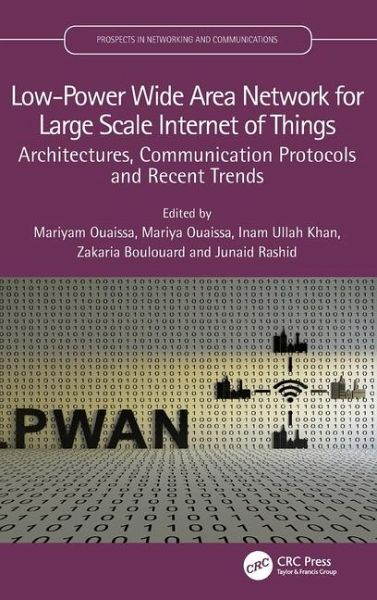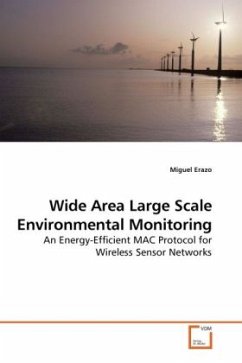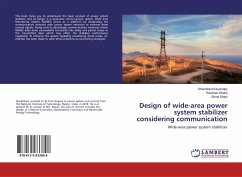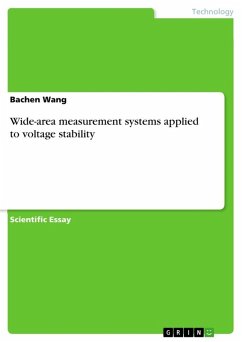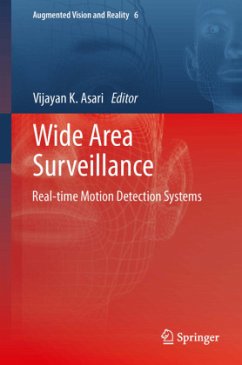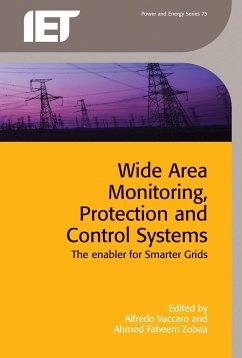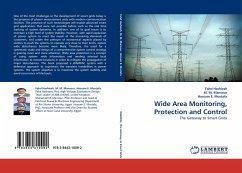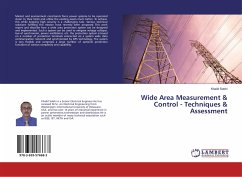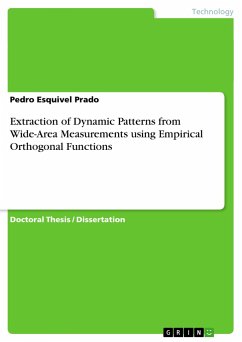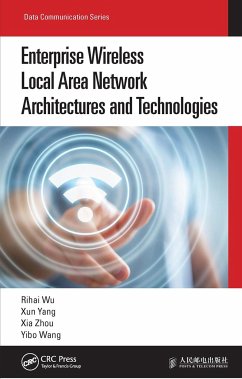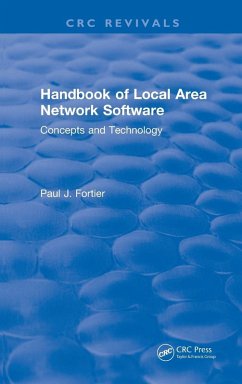Gebundenes Buch
Low-Power Wide Area Network for Large Scale Internet of Things
Architectures, Communication Protocols and Recent Trends
Herausgeber: Ouaissa, Mariyam; Khan, Inam Ullah; Ouaissa, Mariya
Versandkostenfrei!
Versandfertig in 1-2 Wochen
Weitere Ausgaben:

PAYBACK Punkte
75 °P sammeln!




This book presents a comprehensive exploration of LPWANs, delving into their fundamental concepts, underlying technologies, and the multifaceted challenges they tackle.
Dr. Mariyam Ouaissa is currently an Assistant Professor in Networks and Systems at ENSA, Chouaib Doukkali University, El Jadida, Morocco. She received her Ph.D. degree in 2019 from National Graduate School of Arts and Crafts, Meknes, Morocco and her Engineering Degree in 2013 from the National School of Applied Sciences, Khouribga, Morocco. She is a communication and networking researcher and practitioner with industry and academic experience. Dr Ouaissa's research is multidisciplinary that focuses on Internet of Things, M2M, WSN, vehicular communications and cellular networks, security networks, congestion overload problem and the resource allocation management and access control. She is serving as a reviewer for international journals and conferences including as IEEE Access, Wireless Communications and Mobile Computing. Since 2020, she is a member of "International Association of Engineers IAENG" and "International Association of Online Engineering", and since 2021, she is an "ACM Professional Member". She has published more than 30 research papers (this includes book chapters, peer-reviewed journal articles, and peer-reviewed conference manuscripts), 10 edited books, and 6 special issue as guest editor. She has served on Program Committees and Organizing Committees of several conferences and events and has organized many Symposiums / Workshops / Conferences as a General Chair. Dr. Mariya Ouaissa Dr. Mariya Ouaissa is currently a Professor in Cybersecurity and Networks at Faculty of Sciences Semlalia, Cadi Ayyad University, Marrakech, Morocco. She is a Ph.D. graduated in 2019 in Computer Science and Networks, at the Laboratory of Modelisation of Mathematics and Computer Science from ENSAM-Moulay Ismail University, Meknes, Morocco. She is a Networks and Telecoms Engineer, graduated in 2013 from National School of Applied Sciences Khouribga, Morocco. She is a Co-Founder and IT Consultant at IT Support and Consulting Center. She was working for School of Technology of Meknes Morocco as a Visiting Professor from 2013 to 2021. She is member of the International Association of Engineers and International Association of Online Engineering, and since 2021, she is an "ACM Professional Member". She is Expert Reviewer with Academic Exchange Information Centre (AEIC) and Brand Ambassador with Bentham Science. She has served and continues to serve on technical program and organizer committees of several conferences and events and has organized many Symposiums/Workshops/Conferences as a General Chair also as a reviewer of numerous international journals. Dr. Ouaissa has made contributions in the fields of information security and privacy, Internet of Things security, and wireless and constrained networks security. Her main research topics are IoT, M2M, D2D, WSN, Cellular Networks, and Vehicular Networks. She has published over 40 papers (book chapters, international journals, and conferences/workshops), 12 edited books, and 8 special issue as guest editor. Inam Ullah Khan is the Founder of Internet of Flying Vehicles-Lab at AI-EYS. Recently, he is working as Global Mentor/ Guest Lecturer at Impact Xcelerator, IE School of Science and Technology, Madrid, Spain. Previously, he was working as visiting researcher at King's College London, United Kingdom. Also, he was faculty member at different universities in Pakistan which include Center for Emerging Sciences Engineering & Technology (CESET), Islamabad, Abdul Wali Khan University, Garden Campus, Timergara Campus, University of Swat & Shaheed Zulfikar Ali Bhutto Institute of Science and Technology (SZABIST), Islamabad Campus. He completed his Ph.D. in Electronics Engineering from Department of Electronic Engineering, Isra University, Islamabad Campus, School of Engineering & Applied Sciences (SEAS). Also, he did his M.S. degree in Electronic Engineering at Department of Electronic Engineering, Isra University, Islamabad Campus, School of Engineering & Applied Sciences (SEAS). He had done undergraduate degree in Bachelor of Computer Science from Abdul Wali Khan University Mardan, Pakistan. He authored/coauthored more than 50 research articles in reputable journals, conferences and book chapters. His research interest includes Network System Security, Intrusion Detection, Intrusion Prevention, cryptography, Optimization techniques, WSN, IoT, Mobile Ad Hoc Networks (MANETS), Flying Ad Hoc Networks, and Machine Learning. He served in many international conferences as Session Chair/ Technical program committee member. Also, he served as Guest Editor with many prestigious international journals. Apart from that he is General Chair at International Conference on Trends and Innovations in Smart Technologies (ICTIST'22), virtually from London, United Kingdom. In addition, he also served as editor of several books. More interestingly, he was invited as technology expert many times on Pakistan National Television and other media outlets. Dr. Zakaria Boulouard is currently a Professor at Department of Computer Sciences at the "Faculty of Sciences and Techniques Mohammedia, Hassan II University, Casablanca, Morocco". In 2018, he joined the "Advanced Smart Systems" Research Team at the "Computer Sciences Laboratory of Mohammedia". He received his PhD degree in 2018 from "Ibn Zohr University, Morocco" and his Engineering Degree in 2013 from the "National School of Applied Sciences, Khouribga, Morocco". His research interests include Artificial Intelligence, Big Data Visualization and Analytics, Optimization and Competitive Intelligence. Since 2017, he is a member of "Draa-Tafilalet Foundation of Experts and Researchers", and since 2020, he is an "ACM Professional Member". He has served on Program Committees and Organizing Committees of several conferences and events and has organized many Symposiums/Workshops/Conferences as a General Chair. He has served and continues to serve as a reviewer of numerous international conferences and journals. He has published several research papers. This includes book chapters, peer-reviewed journal articles, peer-reviewed conference manuscripts, edited books and special issue journals. Dr. Junaid Rashid is a Postdoctoral Researcher at the Department of Computer Science and Engineering, Kongju National University, South Korea, from August 2021. He worked as Honorary Senior Postdoctoral Research Fellow at the Center for AI and Data Science, Edinburgh Napier University, Scotland, UK, since November 2020 and awarded the Fellowship in March 2022. He received his Ph.D. Degree from the Department of Computer Science, University of Engineering and Technology, Taxila, Pakistan, in 2020 and respectively his M.S and B.S degrees in Computer Science from COMSATS Institute of Information Technology, Wah Campus, Pakistan in 2016 and 2014. He worked as a Lecturer in the Department of Computer Science at AIR University Islamabad, Kamra Campus, Pakistan, from January 2020 to July 2021. He served as Research Associate and Lecturer from March 2017 to January 2020 at the University of Engineering and Technology, Taxila, Pakistan. He has served as Lecturer (Visiting) from September 2019 to February 2020, September 2016 to January 2017 and September 2015 to January 2016 in COMSATS University Islamabad, Wah, Pakistan. He received a fully funded scholarship for his Ph.D. degree. He has been working as an Academic Editor in PLOS One. He is a program committee member at the International Conference on Advances in Communication Technology and Computer Engineering (ICACTCE'22), Morocco. He has served/been serving as a reviewer of various reputed journals and conferences. He has published many research papers in prestigious journals and conferences. His research interest includes Machine Learning, Data Science, Natural Language Processing, Topic Modeling, Text Mining, Information Retrieval, Pattern Recognition, Fuzzy Systems, Medical Informatics, Computer Networks, and Software Engineering.
Produktdetails
- Verlag: CRC Press
- Seitenzahl: 276
- Erscheinungstermin: 11. April 2024
- Englisch
- Abmessung: 240mm x 161mm x 19mm
- Gewicht: 581g
- ISBN-13: 9781032530796
- ISBN-10: 1032530790
- Artikelnr.: 70115255
Herstellerkennzeichnung
Libri GmbH
Europaallee 1
36244 Bad Hersfeld
gpsr@libri.de
Für dieses Produkt wurde noch keine Bewertung abgegeben. Wir würden uns sehr freuen, wenn du die erste Bewertung schreibst!
Eine Bewertung schreiben
Eine Bewertung schreiben
Andere Kunden interessierten sich für




